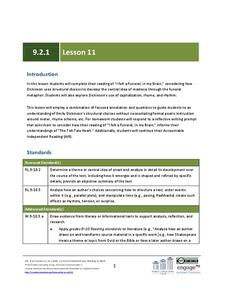Poetry4kids
Onomatopoeia Poetry Lesson Plan
Two exercises boost scholars' knowledge of a onomatopoeia with excerpts from famous poems. In exercise one, participants circle onomatopoeia words. Exercise two challenges writers to choose three words to use in an...
Poetry4kids
Personification Poetry Lesson Plan
Scholars take part in two exercises to boost their knowledge of personification. After reading a detailed description and excerpts from famous poems, writers list action verbs and objects then combine words to create a humorous...
Curated OER
Alphabet Poems
Develop fluency with a variety of works. Help kindergartners use multiple strategies to understand text and decoding. They will create an alphabet poem book on Kid Works 2 to illustrate and write their own poem. In the end, they will...
Curated OER
What Is Poetry?
The first lesson of 12 in a poetry unit asks class members to develop their own definition of poetry. After crafting a response, they examine a variety of examples and decide if the resources are or are not poems.
EngageNY
Poetry Analysis: Small Group Practice
Howdy partner! After discussion and teacher model reading of Slaveships, scholars pair up for a partner reading of the poem. They then use equity sticks to discuss their thoughts of the poem with the class. Readers talk about allusion,...
Curated OER
Poems: calligrams
Have fun with shape poems! First and second graders write calligrams that add to the meaning of their poems. Great for your poetry unit or if you want to combine poetry and art lessons.
Read Write Think
Poetry Portfolios: Using Poetry to Teach Reading
Over the course of five periods, scholars create a poetry portfolio. They begin with a reading of the poem, Firefly. With a focus on vocabulary, learners reread the poem then look for sight words and other skills.
Curated OER
Poetry Writing Unit: Writing a Film Poem
Film poems? To concluded a poetry unit, writers select one of their own poems and create a film that brings to life the sounds and images of their work. Included with the detailed unit plan are daily lessons, student examples, a list of...
Poetry4kids
How to Write a Free Verse Poem
Budding poets compose an original free verse poem. Encouraged to use personification and alliteration, scholars read over three tips and examples then try their hand at drafting a poem of their own style.
Poetry4kids
How to Write an Alliteration Poem
Learners follow five steps to compose an alliteration poem. They choose one consonant and brainstorm as many nouns, verbs, and adjectives they can think of to create rhyming sentences that come together in a poetic fashion.
Utah Education Network (UEN)
8th Grade Poetry: Assess
Eighth graders craft a Petrarchan sonnet and respond to a performance assessment to demonstrate what they have learned in this five-lesson poetry unit.
Utah Education Network (UEN)
7th Grade Poetry: Sonnet Poem
Two sonnets provide seventh graders with examples of Shakespearean sonnets. After discussing the story of the poems and analyzing their rhyme scheme and rhythm, young poets craft a Shakespearian sonnet and share their work with two...
Utah Education Network (UEN)
7th Grade Poetry: Assess
To assess what scholars have learned throughout a five-lesson poetry unit, seventh graders first craft a Shakespearean sonnet based on a poem they have studied. In part two of the assessment, scholars complete a four-texts performance task.
Teacher's Corner
Diamonte (dee-a-MON-tay)
Did you say a diamonte? Ask your young poets to craft and polish this gem of a form poem. The fifth in a series of ten poetry writing exercises.
K20 LEARN
(Not Quite) Breaking All The Rules: Poetry And Grammar
FANBOYS will enjoy breaking grammar rules, but they will have to use coordinating conjunctions, gerunds, compound sentences, compound-complex sentences, and even predicates as they craft poems like Shel Silverstein.
Tiny Mobile
Poetry Creator | Verses
Construct from a canvas of words, lyrical expressions that your budding poets can share and post. Based on refrigerator magnet poetry, creative writers can develop their poetry independently, or from a given prompt from their...
Office of Migrant Education
Poetry: Form, Syllables, Mood, and Tone
Looking for a resource to introduce homeschoolers and other out-of-class learners to the elements of poetry? Check out this packet that defines and illustrates important poetry terms.
Cloud Front
Grammar Camp Worksheet Packet
Whip your students' grammar skills into shape with this series of practice worksheets. Touching on all eight parts of speech, these exercises challenge learners to identify the relationships between different words...
Curated OER
Lesson: Paul Chan: Alternumeric Fonts
Learning to analyze language, symbols, and codes is part of becoming a deep and critical thinker. Young analysts consider their ability to see hidden messages as they analyze the work of Paul Chan. There are two fully developed...
Poetry Class
Free Writing
It will cost you little to ask class members to engage in a free writing exercise that helps even reluctant writers craft a poem.
EngageNY
Grade 9 ELA Module 2: Unit 1, Lesson 11
The capitalization rules are strict and inflexible—until you experience the fluid beauty of an Emily Dickinson poem. Ninth graders test their existing knowledge of language arts conventions with the many bent grammar rules in "I Felt a...
Curated OER
"Ing" Words as Descriptors
This clever lesson has your students listen to story about bugs, work together to brainstorm list of "ing" words that describe bugs, create t-chart of words, choose words to place in poem template to create class poem about bugs, and use...
Poetry4kids
Simile and Metaphor Lesson Plan
Similes and metaphors are the focus of a poetry lesson plan complete with two exercises. Scholars read poetry excerpts, underline comparative phrases, then identify whether it contains a simile or metaphor. They then write...
Poetry4kids
Alliteration and Assonance Lesson Plan
Scholars analyze the poem My Puppy Punched Me in the Eye by Ken Nesbitt in order to locate examples of alliteration and assonance. After reading the poem, alliterative words are underlined and assonant words are circled.

























